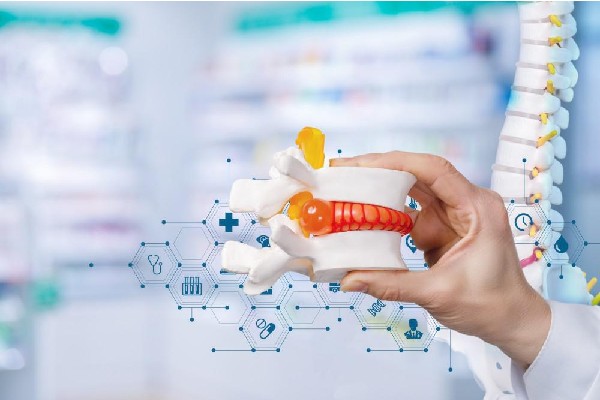An issue with a few of the elastic cushions (discs) which reside in between various vertebrae (vertebrae) that pile to build your spine is referred to as a herniated disc. A spinal disc’s nucleus (smooth, jellylike center) is wrapped in a harder, rubbery covering (annulus).
A herniated disc, also known as a slip or ruptured disc, happens when a portion of the nucleus slips out via a rip in the annulus. This herniated disc might irritate a neighboring nerve if it occurs in any region of the spine. A herniated disc can cause discomfort, numbness, or numbness inside an arm or leg, based upon where located.
A herniated disc can pressure the spine’s nerves, resulting in discomfort, fatigue, and tingling in the neck, posterior, limbs, and feet. Such symptoms could be serious enough to cause major disruptions in your life. The issues caused by your herniated disc must, in most cases, resolve on their own within several weeks. Meanwhile, give some or all of these therapies and the following herniated disc treatment to help you feel much better.
Treatment for herniated disc
Medication
- Counter medicine- The doctor may offer over-the-counter painkiller medication if moderate to mild ache.
- Injections- If oral drugs don’t relieve your discomfort, your doctor may suggest injecting a corticosteroid in the region surrounding your spinal nerves. Spinal imagery could assist in positioning the needle.
- Muscle relaxers- You might well be administered them if you suffer muscle spasms. Fainting and drowsiness are common adverse effects.
Therapy
Your physician might well recommend physical therapy to alleviate your pain. Physiotherapists could show patients how to reduce the ache of a herniated disc by demonstrating postures and activities.
Surgery
Only a small percentage of persons with herniated discs require surgery. If conservative therapy fails to alleviate your problems following six weeks, the doctor may recommend surgery, particularly if you persist in having:
- Pain that is not well regulated
- Numbness or a feeling of weakness
- Having to stand or walk with difficulty
- bowel or bowel control problems
Almost 80% of the time, surgeons can only remove the projecting piece of the disc. It is only very rarely necessary to delete the full disc. In certain circumstances, the vertebrae might have to be united with a bone graft.
Metal hardware is inserted inside the spine to give spinal support during the months-long procedure of bone fusion. The surgeon may, on rare occasions, recommend the implant of an artificial disc.
Home remedies and lifestyle changes
- Resuming daily activities slowly- Allow your discomfort to lead you back to your normal activities. When leaning forward and lifting, make sure your motions are moderate and controlled.
- Avoiding bed rest- Cold packs could be used to reduce pain and inflammation in the beginning. After a few days, moderate heat may provide relief and comfort.
- Applying hot or cold on the affected area- Staying in bed can cause stiff joints and weak muscles, making a healing more difficult. Instead, lie down in a comfortable posture for 30 minutes before taking a brief stroll or doing some work. Avoid activities that aggravate your pain.
Wrapping up
The majority of herniated discs heal on their own or with therapy. However, they may occur again. Consistently sit and stand up properly to safeguard your spine and avoid another herniated disc. Place one leg on a bench or box if you must stand for an extended amount of time to relieve stress on your back.
Lifting something heavy should be done with caution. To take it up, squat from the knees. Bending first from the waist is not a good idea. It puts an excessive amount of strain on your spine. Maintain a healthy weight. Your back will be put under extra strain if you gain weight. Along with these, the above-mentioned herniated disc treatment could help relieve pain.

